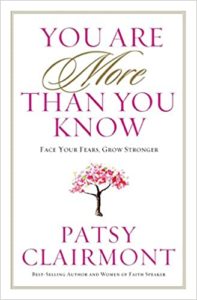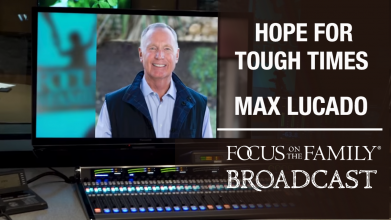Excerpt:
Mrs. Patsy Clairmont: And so, I was drinking about 10 pots of coffee a day – not cups, pots of coffee a day. I was popping pills and taking in a lot of caffeine and nicotine. And I couldn’t figure out why I was such a nervous wreck.
End of Excerpt
John Fuller: We’re featuring a message from Patsy Clairmont today, on how to overcome fear and anxiety and let’s go ahead, Jim, and just say it up front here – 10 pots of coffee is not the way to do that!
(LAUGHTER)
Jim Daly: Settle down, John! We all have worries and troubles in life. The trick is to learn how to manage them. And today we’ll hear how Patsy Clairmont’s fears made her a prisoner of her own home and how the Lord set her free. Patsy is the author of over 35 books. Her latest is called You Are More Than You Know: Face Your Fears, Grow Stronger. Patsy and her husband Les have been married for over 50 years and live in Franklin, Tennessee. She’s been traveling and speaking for 40 years and was one of the founding speakers for the Women of Faith conferences.
John: And here is Patsy Clairmont speaking at a Women of Faith event, on today episode of Focus on the Family. And we’ll pick up after some opening remarks, as Patsy begins her story.
Patsy: I had my first panic attack after my husband and I had, had what you might call a disagreement. And as he turned to walk away from me, every abandonment issue I had rose up to the surface in the form of an anxiety attack. And because I had never had one, I didn’t know what was happening to me. And my pulse increased. My heart was throbbing wildly. My eyes were dilated. I – I – it was just awful. I couldn’t catch my breath. I didn’t know what was wrong with me. He didn’t know what was wrong with me. So, we made a rush to the area hospital. When I got there, they gave me a shot of Demerol and that pretty well knocked me right out.
(LAUGHTER)
Patsy: My husband had a few moments of peace, as did I.
(LAUGHTER)
Patsy: But when I woke up, nobody told me what had happened to me. I – they must’ve have knew it was an anxiety attack, that I wasn’t coping well. But I didn’t know that. And I thought, I must be the only person in the world ever going through such a thing.
And I developed a fear of fear. And I was afraid it might happen again and sure enough, it did. We ended up doing a regular cycle of visitations to the emergency room. And, uh, my life’s boundaries became smaller and smaller. I can’t even call ‘em boundaries – the restrictions that I was putting on myself because of my fear.
And here’s the thing about fears, girlfriends. Fear has friends. If you give in to a fear, he invites them over. And they come in – anger and guilt and shame. And they began to hem me in until not only was I hiding away in my home, feeling incapable of going out in public lest I have another one of those episodes. And since I didn’t know what else to call them and I thought I was the only person in the world going through it, um, it was very paralyzing.
And eventually, I not only hid in my home, but I hid in my bed. I didn’t want to leave my bed. I – this was the prayer I had. “O God, if You would only give me a disease that doesn’t hurt and wouldn’t kill me.”
(LAUGHTER)
Patsy: But just gives me a reason to be in this bed. I would be happy never to leave here again. Aren’t you glad that God doesn’t answer all our prayers?! Hello!
(APPLAUSE)
Patsy: We don’t know what we’re talking about a lot of times. I was looking for a safe place. I was looking to be rescued from all of the things that were intimidating me, which now had become most of life. So, I was hiding away in my bed and I woke up one day and I thought, “Patsy, where’re you gonna go from here, honey?”
And I cried out to God and I said, “I – I can’t do this. I need You to help me. You’ve got to rescue me. I – I don’t know how to get from this place where I feel so stuck.” And there was a voice. Now voices are a little annoying when you’re not stable. But…
(LAUGHTER)
Patsy: There was a voice and it wasn’t an out-loud voice out here. It was an inside voice in here. And – and what I understood that voice to say was, “Make your bed.” And I thought, “Make my bed? What does that have to do with my sanity and getting out of my fears and not being overwhelmed with my guilt and not being overcome by shame?” And everything was too big and too hard, and I was too little and blah, blah, blah. “What do you mean, make my bed?”
That didn’t seem reasonable to me, as if I knew anything about reason. And – and so, I argued with myself and with the voice. And I said, “That makes no sense. O God, I want to do great things for You.” “Make your bed.” So, I got out of bed and I thought, “Well, I could see why that was a good idea already. Now I’m not in it. So, I got out of it and I stood there, and I looked at it and I thought, “Do I have to make both sides?”
(LAUGHTER)
Patsy: Because I only slept on this side and “you know who” slept on that side. Shouldn’t he make his own side?” Oh, I had no anger issues. And so, the Lord gently prompted me to make both sides and to do that every day. That just seemed so incidental, so unnecessary. Here I am suffering and struggling and He’s saying, “Make your bed.” But see I didn’t know that, that was built on a principle and it – and it is this: that when you are faithful in little things, then I will give you more. And when you are faithful in more, then I’ll give you much.
But I hadn’t even been faithful in the least of things and I wanted Him to give me everything. I wanted Him to be “Great Magician.” He said, “No, no, that’s ‘Physician’ and you, honey, need surgery.”
(LAUGHTER)
Patsy: I wanted Him to fix me in the night while I was resting, so I could rise up righteous in the morning. But His way of doing it was so distant from mine. And His was to invite me into the fray of my own emotions, that we might begin to untangle some of the snarls that were there. I went back to my doctor and I said to him, “Do not give me one more pill.” You see, I was at that time, a fairly addictive person. And I was trying all the coping skills I could think up, all my bright ideas. And so, I was drinking about 10 pots of coffee a day, not cups, pots of coffee a day. I smoked two packs of cigarettes a day and I took four very strong tranquilizers every day. The doctor said, “I give you enough to knock out a horse.” And I thought, “Well, that’s where my horse went.”
(LAUGHTER)
Patsy: He said, “And it barely fazes you.” So, I was popping pills and taking in a lot of caffeine and nicotine. And- and I couldn’t figure out why I was such a nervous wreck.
(LAUGHTER)
Patsy: Yeah. So, I said to the doctor, “Do not give me one more pill. I want you to help me get well.” And he said, “Well, I’d like you to go to church.” I said, “If I could do that, I wouldn’t be here.” And he said, “Okay, all right.” He said, “There is a self-help group that you could go to.” And he said, uh, “They have one in your hometown and one in the town next to your town and you could go to two a week.” So, I started attending, uh, these self-help group meetings. But the first one was a huge step, and may I say to you, if you feel stuck, it’s necessary in your “stuckness” to take and a risk a step forward. It will always feel unnatural and threatening. But it is the way we find our liberty, is our willingness to take a step. And I hope it doesn’t take you as long as it did me, ‘cause I was really dragging my feet on going forward, because I was so self-protective and I don’t know what I thought I was protecting, because my life was a mess.
So, I went to the first meeting, but I made my husband go with me. He didn’t come inside to the meeting. He sat outside and waited for me. And so, he took me there and he dropped me off and I went in. And they began talking and they were talking my language of being broken and finding hope.
I listened to them and I thought, “Well, for heaven’s sakes, I am not the only banana cracker out there.”
(LAUGHTER)
Patsy: There’s a whole box of us right here in this room. There is something that gives you such hope when someone understands where you’re coming from. I love that. That is why God has given us the body of Christ, that we might come together and that we might give hope one to another.
And so, I came out of that meeting, um, absolutely thrilled. In fact, after that meeting, I never again had to be taken back to a hospital with an anxiety attack. I had many anxiety attacks after that, but I finally found out I wasn’t the only one, that there was a way to handle this and to manage myself. I didn’t know that. So, every word they said was thrilling to me, until they told me the guidelines that you had to use to participate in the, um, meetings. And it was that you would tell a story of something that was really hard for you to deal with. And that in the dealing of it, you didn’t handle it well. And – and you tell this story and then they help give you principles that you can put into place, so that you can deal with that situation more rationally. So, I was all for that until they said, there are three things you cannot do when you tell your story. You cannot complain. You cannot whine. And you cannot exaggerate.
(LAUGHTER)
Patsy: I thought, “What! You’ve taken my three best tools away from me.” I mean, how can I not complain? And I don’t whine. I’m not a whiner.
(LAUGHTER)
Patsy: (Clears throat) But the exaggerating part of it, that was tough, because how am I certain that you have truly understood, uh, how bad it is for me if I don’t make it as big as possible? And when I found out about those three things, the complaining and the whining and the exaggerating, is those are three ways we keep anger going. It’s three ways we cement our feet into the stuck place we’re in and then blame others we’re like this. It is the three ways that will eat up the vitality of our faith and keep us believing the lie that we can’t be any more whole than we are right now.
And life is made to be an ongoing journey, for us to enter into fully and freely. And I didn’t have fully or freely, but I was sure wanting it pretty bad. But I didn’t desire it until I got to the bottom of myself. Sometimes we try to rescue people. And we go in too soon to do for them what they should’ve done for themselves. And they never get to the end of themselves and surrender to the plan of God. So, come alongside people, but don’t rescue them from the very things that God could use to draw them to Himself.
John: You’re listening to Patsy Clairmont on Focus on the Family. And this reminder that you can get a CD of this entire presentation and Patsy’s book about overcoming your fears when you call 800, the letter A and the word FAMILY. 800-232-6459. Or donate and request those at focusonthefamily.com/broadcast. Let’s return now to more from Patsy Clairmont.
Patsy: And so, I went into this meeting and I heard the words of hope, that I was not alone and I began to take the skills that they were teaching in – in the group and I realized that every skill they had lined up with a principle of God’s Word. And that’s why it worked.
And so, I’ve come with a word of encouragement to you, that your broken emotions, um, they leave you in a very vulnerable place, but as God picks up the brokenness of your life, it’s like putting the pieces and shards of glass into a kaleidoscope and holding it up and spinning the wheel. And suddenly, because light has touched it, there’s beautiful patterns that appear. And what looked like it could have no value, now becomes the most priceless thing that you have to offer another person. And that is the work that Christ has done in you.
I learned for me, that I needed to have boundaries on my emotions. Um, for me to say everything that was on my mind was in no one’s best interest and Proverbs says, “To tell it all is foolishness. It is a wise person who restrains his lips.” And so, that was really important for me to learn to have boundaries on my emotions and to harness my thoughts.
There is a little three-step thing that I have given out for years and will do it as long as there’s breath in my body if I think it will help one of you to collect your thoughts up in a way that really helps you. And that is, when you have impure, unkind, unlovely, ungracious thoughts, refuse those thoughts. That’s based on the “casting down of imaginations and every high thing that would exalt the – itself against the knowledge of God and bringing into captivity every thought to the obedience of Jesus Christ.” And you refuse those things you know you shouldn’t be thinking on.
And then you replace it, because if you don’t replace it with something, you’re a vulnerable space cadet. You got all that empty space and the enemy would love to come and tap dance around in there. So, you have to replace it with something, and this is based on Philippians, chapter 4. “Think on those things that are good and true and pure and lovely and just and of good report. And if they have any virtue and if they have any praise, to think on those things.”
So, you’ve refused it. You’ve replaced it. Now you have to repeat that process again and again, ‘cause the enemy will come back and say, “Are you available now to think about this?” And you’ll have to continue to do that as a discipline. And you will find that your mind becomes stronger. You are not as easily harassed with thoughts that you know are right from the enemy himself. So, that becomes really important.
Also, if I might add another R that has already been mentioned by my friend, Andy. It is “reading.” Ladies, that was one of the redemptive ways that God not only gave me boundaries for my thought life, um, but gave me the education I didn’t have.
Uh, and so, what I found is, that when He gave me such a voracious appetite for books, I read all my friends’ books that they owned. And – and then when I got through and they weren’t keeping up with things and replenishing their libraries, I then opened a small bookstore in my home to supply my habit. Because now my habit had become that I was hungry for hope. And I wanted to see how other people kept their lives together and their marriages together and how they nurtured their children and how they celebrated each other and how to do friendship and on and on and on.
And – and books were – were available. So, I would read all the books in my little bookstore before I sold them. It was a way that helped me to continue to grow and – and continuing to grow is important. I remember a young woman I was talking to. She was struggling in her marriage. And I said, “Honey, have I got some books for you.” She said, “No, no. I don’t read. Neither does my husband.” I said, “Well, can you read?” “Yes, yes, of course we can read. We’re well educated.” “Then why wouldn’t you read?” “Well,” she said, “we don’t like other people’s opinions interfering in our relationship.”
(LAUGHTER)
Patsy: I said, “Something needs to interfere. You’re having a hard time here.” And she said, “Well, we – we don’t read books.” Um, now I’m not saying this is the reason they ended up getting a divorce, that they didn’t read a book, but I am saying that if your heart isn’t teachable enough to open up to truth, then you’ll stay stuck. And the next marriage for her failed, as well. And then the next one.
Uh, I – I just want to say to you, if you’re a non-reader, the way you can become one is to do books on tape. Um, join a book club with people you like, so you look forward to seeing them, even though you didn’t want to read the book.
(LAUGHTER)
Patsy: And then you get into discussions and it helps you. I found it is very important to place myself around people who are ahead of me, so that I can learn from them. And I ask them, “What are you reading these days?” I’m always checking with my porch pals, “What’s up now? What’s on the reading list? How’s it benefitting you? Is it a book that will nurture and help us to grow or just entertain and delight us?” So, I encourage you to be readers.
But not only did I need boundaries on my emotions, and I needed to harness my thoughts, but I needed as I talked about earlier, I needed to minimize my word count. If you find that every time someone takes a breath you jump in, uh, it could be you have more words than are necessary for anybody to hear. And you might want to back off. You might want to go on – on a little word diet. Um…
(LAUGHTER)
Patsy: And there’s a way you can do that. You can practice. Start by going one hour a day during the day while everyone’s a way, one hour a day without any words at all, not saying a word. It’ll do a couple of things for you. It will cause great mystery to break out in your home.
(LAUGHTER)
Patsy: Uh, that will be one of the things. Uh, but it will begin to help you to get some control and some boundaries on your words. People often will say to me, um, “How did your husband ever put up with you during those years?” And I say, “Well, that is a good question.” So, I went to him and I said, “Les, when I was at my worst in my agoraphobia, how did you put up with that?” And he said, “Well, didn’t seem like that big a deal to me.” I said, “Really?” That really was a big deal, so I couldn’t imagine why it wasn’t a big deal for him until one day as I was thinking about it, it came to me that he grew up, uh, with an alcoholic, abusive father.
And I – I don’t mean he was crabby. I mean he was violent. He threw knives at the children. He shot guns at them. I mean, it was terrible, and he beat their mother, which for those children, was probably the most damaging thing that happened. You listen to me if any of you are in here and are being abused and think it’s only about you. I still watch my husband shudder and tear up and become emotional at the thought that as a child, he could do nothing. He could do nothing to rescue his mom. He wanted to. It was in his heart. And what happened was, he grew up and became a – a caretaker. He – he wanted to rescue every woman who was in trouble and then he met me.
(LAUGHTER)
Patsy: He thought, “This’ll last a lifetime.” And so, we married and that was, uh, 48 years ago in July. Shouldn’t a worked. Shouldn’t a worked.
We are all broken people. Hello! We are all broken people. We have all had broken hearts and broken dreams. But what keeps me going and celebrating is the fact that when I offer all those fragments, all those shards up to the Lord and hold them up to His light, their beautiful patterns begin to develop.
God bless you, ladies. God bless you.
(APPLAUSE)
John: She is such a delightful person. Patsy Clairmont speaking at a Woman of Faith event on Focus on the Family.
Jim: She is delightful, John, and her story is just one more example of the fact that, as Patsy likes to say, “God uses cracked pots” which was the title of her first best-selling book, published by Focus on the Family. You know, only God can take a woman from being housebound, literally bedridden, and turn her into someone who can travel and speak to thousands of women in large arenas. Only God can do that. And let me remind you. God works through our staff here at Focus on the Family, to help people in need like Patsy was in those early days of her marriage. Here’s just one example from our counseling team: “A woman in crisis called for help. And her husband had been killed in a boating accident the previous day, and she was overwhelmed with the decisions that had to be made. The counselor offered ideas for how to respond to family members, who had conflicting opinions about the funeral arrangements. The woman also had many questions about eternal life, and the counselor provided words of comfort from the Bible and prayed with her.”
John: I am – I just can’t imagine the pain she was going through. What a hard situation. I am so glad she called us, though.
Jim: Well, you’re overwhelmed with everything, right? Um, and I have to thank the Lord and you, our donors, for making it possible for our highly-trained team of counselors to be here, to provide that kind of support to folks that need it. It’s because of donors like you that we’re able to offer our counseling services free of charge. If you have a heart for people with these kinds of needs, can I encourage you to become a monthly partner of Focus on the Family? That’s really the best way to help us even-out our budget and keep this outreach thriving. And when you make a monthly pledge of any amount, I’d like to send you a copy of Patsy Clairmont’s book called You Are More Than You Know: Face Your Fears, Grow Stronger. And if you can’t make a monthly commitment – we know times have been difficult for many families affected by the coronavirus pandemic – we can still send you that book for a one-time donation of any amount.
John: Yeah. And Patsy’s book will show how to go from a fear-based life to faith-based freedom. And so, get you copy when you call 800-A-FAMILY. Or donate online and request that book at focusonthefamily.com/broadcast. By the way, when you’re online, be sure to look for a free PDF that we have. Patsy has provided this. It’s called “10 Steps to Soothe Your Soul When You’re Feeling Anxious.” Next time on this broadcast, a brave mom who chose to carry her terminally ill baby to term against her doctor’s advice. You’re hear her story and the lessons she learned about God’s love.
Teaser:
Mrs. Sarah Williams: She was the greatest gift God ever gave, because through loving her, God showed me His own heart. She was God’s gift to us because she taught us how to love somebody who needs our love.




















